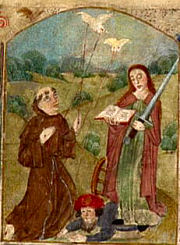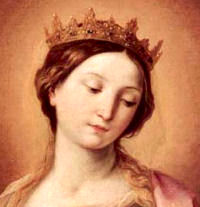Ordinary Time: November 25th
Optional Memorial of St. Catherine of Alexandria, virgin and martyr
Other Titles: St. Katherine
» Enjoy our Liturgical Seasons series of e-books!
From time immemorial St. Catherine had been venerated at the monastery on Mount Sinai when, in the fifteenth century, the monks discovered her body. Legend has made of her a young Christian of Alexandria who rejected the advances of the Emperor Maximinus and routed a meeting of learned men gathered together to induce her to deny Christ. This feast was restored to the calendar in 2002.
St. Catherine of Alexandria
The account of her martyrdom is legendary and defies every attempt to cull out the historical kernel. Old Oriental sources make no mention of her. In the West her cult does not appear before the eleventh century, when the crusaders made it popular. She became the patroness of philosophical faculties; she is one of the "Fourteen Holy Helpers." The breviary offers the following:
 Catherine, virgin of Alexandria, devoted herself to the pursuit of knowledge; at the age of eighteen, she surpassed all her contemporaries in science. Upon seeing how the Christians were being tortured, she went before Emperor Maximin (311-313), upbraided him for his cruelty, and with convincing reasons demonstrated the need of Christian faith in order to be saved. Astounded by her wisdom, the Emperor ordered her to be kept confined, and having summoned the most learned philosophers, promised them magnificent rewards if they could confound the virgin and turn her from belief in Christ. Far from being successful, a considerable number of the philosophers were inflamed by the sound reasons and persuasiveness of Catherine's speech with such a love for Jesus Christ that they declared themselves willing to offer their lives for the Gospel.
Catherine, virgin of Alexandria, devoted herself to the pursuit of knowledge; at the age of eighteen, she surpassed all her contemporaries in science. Upon seeing how the Christians were being tortured, she went before Emperor Maximin (311-313), upbraided him for his cruelty, and with convincing reasons demonstrated the need of Christian faith in order to be saved. Astounded by her wisdom, the Emperor ordered her to be kept confined, and having summoned the most learned philosophers, promised them magnificent rewards if they could confound the virgin and turn her from belief in Christ. Far from being successful, a considerable number of the philosophers were inflamed by the sound reasons and persuasiveness of Catherine's speech with such a love for Jesus Christ that they declared themselves willing to offer their lives for the Gospel.
Then the Emperor attempted to win her by flattery and by promises, but his efforts proved equally fruitless. He ordered her whipped with rods, scourged with leaden nodules, and then left to languish eleven days without food in prison. The Emperor's wife and Porphyrius, general of the army, visited Catherine in prison; her words brought both to Christ and later they too proved their love in blood. Catherine's next torture consisted of being placed upon a wheel with sharp and pointed knives; from her lacerated body prayers ascended to heaven and the infernal machine fell to pieces. Many who witnessed the miracle embraced the faith. Finally, on November 25 Christ's servant was beheaded (307 or 312). By the hands of angels her body was carried to Mt. Sinai, where it was interred in the convent which bears her name.
—Excerpted from The Church's Year of Grace, Pius Parsch
Patronage: Apologists; craftsmen who work with a wheel (potters; spinners; etc.); archivists; attorneys; barristers; dying people; educators; girls; jurists; knife grinders; knife sharpeners; lawyers; librarians; libraries; maidens; mechanics; millers; nurses; old maids; philosophers; potters; preachers; scholars; schoolchildren; scribes; secretaries; spinners; spinsters; stenographers; students; tanners; teachers; theologians; turners; unmarried girls; wheelwrights. See CatholicSaints.info for a full list.
Symbols and Representation: Wheel set with sharp knives; broken wheel; sword; crown at her feet; hailstones; bridal veil and ring; dove; scourge; book; spiked wheel; woman strapped to the spiked wheel on which she was martyred; woman arguing with pagan philosophers
Highlights and Things to Do:
- Learn more about St. Catherine:
- Enjoy beautiful artwork of St. Catherine:
- Try some recipes for St. Catherine from Catholic Cuisine.
- St. Catherine's remains are in St. Katherine's Monastery on Mt. Sinai. The Monastery, a 1,600-year old fortress at the base of Mt. Sinai, is inhabited by Coptic monks (not in union with Rome). Inside the chapel is believed to be the Burning Bush, through which God first appeared to Moses. Read more about the history of the Church of Alexandria and the Council of Chalcedon where the Coptic Church broke from the bark of Peter and pray for the reunion of all Eastern Churches under the Pope.
- See August 8 for more information about the Fourteen Holy Helpers.



